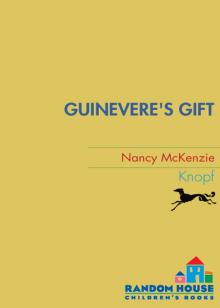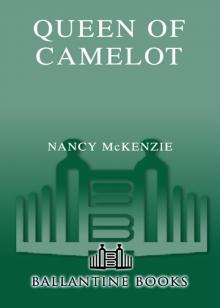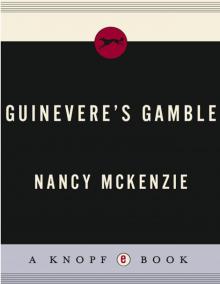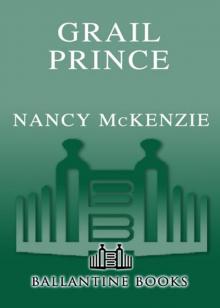- Home
- Nancy McKenzie
Queen of Camelot
Queen of Camelot Read online
QUEEN
of CAMELOT
NANCY McKENZIE
BALLANTINE BOOKS
NEW YORK
Table of Contents
Title Page
Frontispiece
Dedication
Acknowledgments
Book 1
Prologue
Chapter 1
Chapter 2
Chapter 3
Chapter 4
Chapter 5
Chapter 6
Chapter 7
Chapter 8
Chapter 9
Chapter 10
Chapter 11
Chapter 12
Chapter 13
Chapter 14
Chapter 15
Chapter 16
Chapter 17
Chapter 18
Chapter 19
Chapter 20
Chapter 21
Chapter 22
Book 2
Chapter 23
Chapter 24
Chapter 25
Chapter 26
Chapter 27
Chapter 28
Chapter 29
Chapter 30
Chapter 31
Chapter 32
Chapter 33
Chapter 34
Chapter 35
Chapter 36
Chapter 37
Chapter 38
Chapter 39
Chapter 40
Chapter 41
Chapter 42
Chapter 43
Chapter 44
Chapter 45
Chapter 46
Chapter 47
Chapter 48
Chapter 49
More Praise for Queen of Camelot
Copyright
To Callie Louise, my mother
Anyone who has ever read any one of Mary Stewart’s Merlin trilogy (The Crystal Cave, The Hollow Hills, The Last Enchantment) will know how much I owe to her vision of fifth-century Britain. These books, among others, inspired me to create my own tale about Guinevere, Arthur, Lancelot, and the real world these legendary people inhabit. I am indebted to many who have contributed to the Arthurian tradition, historians, and storytellers alike. As I have built upon the works of others, so I hope some future writer might build upon mine. After all, that is the ultimate compliment—to be considered even a small part of the tradition surrounding this ancient, time-tested tale.
Special thanks are due to several people whose help and encouragement are directly responsible for the publication of this book. Meg Affleck, my sister and first reader, went to a lot of trouble to convince me to find an agent; Bruce McKenzie, my husband, gave me the courage to try; Virginia Kidd, my agent, supplied good advice and dealt patiently with my questions; and Deborah Hogan, my editor, worked long and hard to give my story shape.
I thank also my friend Kate Delaney for her gift of Xenophon’s On Horsemanship, and John Downey of the Andrus Planetarium, The Hudson River Museum, for his prompt answers to astronomical questions. Karen Kramer gave me invaluable support and advice about writing and editing; Caroline McKenzie helped me research White and Malory; Marsha Gorelick and Lydia Soifer provided me a constant source of excited and enthusiastic support, and Joellen Finnie listened patiently to hours of proposed interpretations of Arthurian tales.
Finally, my thanks to Shelly Shapiro, editorial director of Del Rey Books for republishing The Child Queen and The High Queen in a single volume, which is how I originally submitted these stories. This version of my Guenivere tale is much more faithful to the original manuscript in both structure and format. Many changes that were made to enable a single story to be published as two seperate books have been eliminated in this volume, making Queen of Camelot, like a prodigal child, dearer to my heart than either of its predecessors.
—Nancy Affleck McKenzie,
September 2001
BOOK I
THE CHILD
QUEEN
PROLOGUE
I was alone in my cell when the abbess came for me. For hours I had been trying to pray, but I could not stay on my knees. The darkening sky and freshening breeze among the willows by my window broke in upon my peace. And then I thought I caught the thud of a horse’s canter from the road beyond the monastery walls. When the abbess finally knocked, I was half expecting her and stood serene before her hasty curtsy. Kind woman, she had never learned the art of dissembling and her weathered face betrayed her disapproval and her fear.
“My lady Queen.”
“Please, Mother,” I murmured as a small thrill of terror shook me. If the rumors that had flown about the land the past weeks were true, I was no longer Queen, and whoever had come for me might well have come to take me to my fate. Indeed, it was hard to image another reason for a visitor, or for the Mother’s fear. But I had heard only one horse.
“My lady,” she began again. “You have a visitor in the garden.”
I waited. With lowered eyes, she seemed to seek guidance from the polished stones of the floor. “I told him you do not receive visitors. He bade me give you this and ask you to come.”
I gasped. In her hand she held his ring, the great ruby with the Dragon of Britain carved small. I took it from her, trembling. It was warm, as if it had just come from his finger. My knees shook and for a moment I feared I might fall.
“Mother!” I cried. “Is it the King?”
Then her sad eyes met mine, her compassion overcoming her fear. “No, my lady. It is not the King, but a king’s messenger. Her has ridden hard but will not tarry long. Time presses upon him.”
“I will go at once,” I replied, and with her help adjusted the white veil of mourning over my face. She walked with me as far as the garden entrance and then, with a quick obeisance, left me.
I did not see him at first. The garden was small and private, surrounded by high walls. Pear trees stood silent, slowly turning color in the autumn light; the herbs of summer were gone; the roses recently pruned; only golden chrysanthemums blazed at the corners of the walks. A last ray of sun escaped the approaching storm clouds and lit the smooth alabaster of the Virgin’s statue.
Then I saw him. He was kneeling before the statue, head bent in prayer, a weary knight, the dust of travel still upon his clothes. But I would know that back anywhere, among thousands, and in spite of myself, my heart leaped within me.
The Mother’s disapproval was now clear to me, and her fear as well. She would never fear for my death—what was that but going home to God? But she feared mightily for my soul.
I walked slowly toward him. He rose and turned, and I lifted my veil. He had washed his face and his hair and his hands. We looked at one another a long time. Then he went on one knee, took my hand and pressed it to his lips. I caressed his black head, wondering desperately why I should feel so pained by the silver threads I found there. He led me to a bench and we sat silent, looking at one another in a kind of quiet desperation, because we had said good-bye forever long ago.
“Gwen,” he said at last. There were new lines in his face and a weariness in his soul, an admission of defeat that was new to me. I did not need to ask what it was. I opened my hand and looked at the King’s ring.
“It is true, then,” I whispered, daring the words for the first time. “Arthur is dead.”
“I helped to bury him,” he said in a low voice. “Niniane took him to Ynys Witrin. The priestesses prepared him. The monks dug his grave on the Tor. It was—it was dreadful.”
“And you were hurt?”
Light leaped to his face, and he quelled it. “Yes. But it’s better. I accompanied him. There was no one left.”
“What? Did none survive?”
“None. Gwen, they are all gone.” His voice shook and he bowed his head.
I sat stunned. �
�Kay? Ferron? Gereint? Galahantyn?” I whispered. “Even Bedwyr?”
He nodded, head down.
“And—and Mordred?” That steadied him. He looked up, the old dislike in his eyes.
“Mordred killed him. It was Mordred’s hand that struck the blow, cursed be his name forever! Mordred opened his head. He fulfilled his fate, as Merlin predicted. You backed the wrong horse, Gwen.”
I took both his hands. The pain between us was unbearable.
“God called Arthur home. God guided Mordred’s hand. It had to happen. If we don’t believe that, we shall go mad.” I felt the bitter tears on my face, and I felt his eyes on them. “You have been away a long time. You have heard rumors. But, my dear, this you must believe. There was never any King for me but Arthur.”
He kissed my fingers. “I never doubted you, Gwen. But I have always doubted Mordred. He was ambitious.”
“Was?” My voice broke. “Oh, dear God! Is he dead then? By whose hand?”
“By Arthur’s,” came the cruel reply. “Arthur slew him in the same instant he received his death blow.”
The truth was so plainly written on his face that I burst into tears and had to hide my face in my hands. Angrily he paced the garden walk.
“S’trewth! I never thought to see more tears shed for a traitor and a King-slayer than for the King!”
I prayed God for the strength to recover myself—this was a grievous blow indeed. I had believed, in spite of the rumors, in my heart of hearts, that Mordred must be ruling as High King, biding his time until the remnants of Arthur’s army would rally to him, and he could ratify his precious treaty with Cerdic the Saxon and secure Britain’s borders forever. My dear Arthur! My poor Mordred, who fought so hard against his fate! Whatever was the future to hold for us Britons now? Were we, in fact, still a nation at all? Or was I a Welsh princess once more, and Lancelot a Breton, as we had been in the dark days before Pendragon?
“Are we in the hands of the Saxons, then?” I cried, and he turned to me in surprise.
“The Saxons? No, not yet. Constantine is King. Who else?” He came back to me and sat down. “I thought you grieved for Mordred. I know you loved him, though I will never fathom why.”
“Dear God, I loved him too much. But not as you and others think, you who should know better.”
“I never—”
“Yes, you did. In your heart you have doubted even me.”
He bowed his head. He would never understand what had been between me and Arthur’s son, who had fought so hard and cared so much. To Lancelot he would always be a traitor. To Lancelot, and to all of Britain.
“I have grieved for Arthur this fortnight past,” I said slowly. “In my heart I am with him, as he is with God. But Mordred is gone from me forever. That devil’s spawn Merlin was right. His name will be dragged through mud for centuries to come. No one but I will ever know his goodness.”
There was silence between us, but thunder rumbled far off and Lancelot stirred.
“I have not yet told you why I came. Three things I have to tell you. Then I must be off.” He glanced sideways at the door and suddenly I was afraid.
“Are you pursued?”
“Of course. By both Constantine and Cerdic. For different reasons. The last of the Companions. Never mind. Before Arthur died, as Morgaine held his head in her lap, he spoke of you.”
I bowed my head, not knowing what was coming. The dying words of a King were powerful by every magic known to man. But I knew that since it was Arthur, they would be merciful.
“He blessed you, Gwen, and he expressed the wish that when your time comes, you be buried with him. In the same grave.”
The tears ran freely down my face as I felt the love of that strong heart reach out to me, even from death.
“I have left instructions for this with the abbess, or her successor. She has promised upon the Book of God that it shall be done.” He paused, and by the strength of his control I knew what was coming next. “I am on my way home to Less Britain. My lands are divided, my troops scattered. If my sons are to have any birthright, I must go back and put things straight. If Constantine wants me badly enough, he can come find me. But he will not. Cerdic will be watching his back.”
I smiled inwardly. Here we were, finally alone and unobserved at this singular time in our lives, and we talked of affairs of state. It was fitting, I thought. See how far we had come. But I smiled too soon.
“If you would do me the honor, my dearest Queen, my only love, I would take you with me, and you should spend the rest of your days with me. Come out of your fastness, Gwen. Come with me. This is our chance at last. There will never be another. Come with me now.”
His heart was in his eyes, and I knew well that nothing had changed between us since the first moment we had met; we had waited all our lives for this. He desired this, and yet he feared it. He was reluctant, and yet his eagerness was like the flame of youth. For so many years I had loved him but had been held by stronger vows. And now, at last, we were free.
I looked up at the swirling sky, where dark thunderclouds piled against one another in oncoming fury, and felt again the bitter agony of deep desire. I saw Ygraine and Uther, bound in a powerful passion that held a kingdom together but lost them their son. I saw Merlin, with his damning eyes, all his powers focused on Britain and her preservation, who let no one, man or woman, stand in his way. And I saw Arthur, sober and patient and kind, waiting for my decision, waiting to see if at the last, and for such a reason, I would betray his memory, his work, his Kingdom. I thought of Elaine, who had struggled once with such a passion, and I forgave her, after all these years. Last, I am afraid, I thought of my promise to God.
“Thank you, sweet Lancelot, for the invitation. God knows I have waited many years to hear it. But I cannot, my love. It is too late.”
He kissed me then, and in his touch I felt both joy and sorrow. In a perverse way he was glad I had chosen to stay. He knew it was impossible and wrong, but it had been impossible not to ask. He relied, as he had so long ago, on my judgment. Only I knew how close I had come to giving in.
“My precious Gwen,” he whispered, going down on one knee. “You are steadfast and unchanging, the only virtue in a wicked world.” He drew my hand to his cheek and kissed my palm. “There is one thing more. I had a vision on Ynys Witrin after we buried Arthur.”
I stared at him. “You had a vision?”
He nodded fervently. “I do not know if it was God who sent it, or Mithra, or Niniane, or even Merlin. They all spoke to me. I was to come to you when it was safe, bearing a message.”
For half a second I both hoped and feared he would command me to go with him, quoting divine direction, but he had never been a subtle man.
“You are to write it down, Gwen. The story of your life. Of Arthur’s deeds. Of the times.”
If he meant to shock me, he succeeded. “Me? Write it down? A woman’s words? Whatever for?”
“Merlin spoke with his voice of power. He commanded you to do it, and not to question—”
“That sounds like Merlin.”
“—and to be faithfully honest, as you are. Those were his words, Gwen. ‘Faithfully honest.’ And you used to think he disliked you. Do it, and tell the world the truth about us, and the truth about Mordred, if you like. There’s no harm in it, is there?”
I thought about this awhile, holding his hand and letting his head rest in my lap, knowing that this time it would truly be the last time.
“No one will listen to a woman. And there is no one alive now who would believe a word I said. It wouldn’t suit their purposes.”
“Then perhaps it shan’t be read by those alive now. Perhaps it will come to light when times have changed and the people of Britain wish to know the truth about their King and Queen.”
Like Arthur, Lancelot knew how to win me over. “The people of Britian” never failed. And suppose he really had seen a vision?
“All right,” I said. “I suppose I might try it. It
will give a purpose to the years I have left.”
He rose and took my arm as the first few raindrops splashed on the warm, gray stone of the garden walls. I walked him to the gate, but there we lingered, the postern guard eyeing us, reluctant to come to our final parting. Suddenly I remembered the ring, which I had held in my hand all this while.
“Am I to keep this ring or are you to take it home to Lanascol?”
“It is yours. I took it from his finger.”
“Did he bid you bring it me?”
“He was beyond speech.”
My throat ached suddenly but I persisted. “And his Sword? Where is that?”
He cleared his throat uncomfortably. “When I heard his death sigh, I became enraged with grief,” he said in a low voice I had to strain to catch. “I took the Sword out of his very hand and threw it into the Lake of Avalon. You could say it has disappeared.”
I gazed at him in frank astonishment. “Why did you do that?”
He braved himself for his reply, standing stiffly. “I heard Merlin’s voice telling me to do it. ‘From the deeps of the Underworld has it come, and so shall it go home.’ ”
Merlin’s words sounded strange on Lancelot’s lips, but I believed them nonetheless. Arthur had believed that Merlin died, but Merlin’s spirit was alive in the world after his passing. This was fact.
“If Excalibur has gone, then Britain is forsaken,” I whispered. “We are dead, Lancelot. Our time is past.”
He nodded heavily, and that weariness of spirit which I had first noted in him returned once more. “Yes. It is over. I shall disappear into Less Britain, and you shall vanish within this fastness. Forever. Unless you leave our tale behind you.”
The breeze blew up suddenly, cold on the back of my neck. I gripped his hand. “Lancelot.”
“Sweet love, I must go.”
“Now?”
He kissed me formally, courtier to Queen, for eyes were watching.
“Go with God,” I managed.
“Good-bye, Guinevere.”
The storm broke.
1 GISELDA’S PROPHECY
The night of my birth the famed witch Giselda, the ugliest woman in all Britain, came to see my father, the King of Northgallis. It was the last night in April, cold and blowing a fine, icy rain. My father and his drinking companions, such nobles and petty lords as could leave their lands in the hands of others, sat in the hall before a great log fire while the women attended my mother and brought him tidings as the night wore on.

 Guinevere's Gift
Guinevere's Gift Queen of Camelot
Queen of Camelot Guinevere's Gamble
Guinevere's Gamble Grail Prince
Grail Prince Prince of Dreams
Prince of Dreams